Oxford United, riding high in League Two, provided the FA Cup third round’s principal shock when they eliminated Swansea City of the Premier League at the Kassam Stadium. They will confront Blackburn Rovers on Saturday, a rerun of their celebrated fifth-round tie in 1964 when the Yellows, relative newcomers to the Football League with Ron Atkinson in their ranks, overcame the title-chasing Lancashire club 3-1 at the Manor Ground to become the first Fourth Division club to reach the quarter-finals. Dominic Fifield talks to key figures at the modern-day Oxford United, a club on the rise once more.
The manager: Michael Appleton
A former Manchester United youth-team and Preston North End midfielder whose playing career ended with a knee injury at 28, Appleton was schooled as a coach at West Bromwich Albion before cutting his teeth in management amid financial meltdown at Portsmouth, the difficult politics of Blackpool and, just as briefly, under Venky’s at Blackburn Rovers.
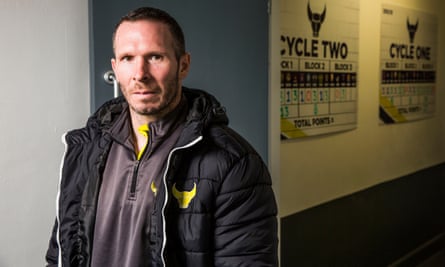
Michael Appleton knows what is coming. The FA Cup has paired Oxford United with Blackburn, the Championship club who jettisoned him only 67 days into a two-and-a-half-year contract and, in doing so, threatened to choke a managerial career in its infancy. If the focus will drift towards a mouth-watering tie, the personal incentive to impress is clear.
There were only two face-to-face meetings with Venky’s in that stint at Ewood Park, one in India and another in London, before the absentee owners cut him loose. The ensuing 16 months were spent in the wilderness, offering Roy Hodgson’s England set-up the odd scouting report. Oxford was his route back in. “I was disappointed rather than scarred by what happened,” he recalls. “Everything I do in life revolves around ‘respect’, and I felt disrespected at Blackburn. I’d been promised something and there was a big job to be done, not least to reduce the wage bill – we did that by about £3m that January – but I felt I could handle it after what had happened at Pompey. We were doing the right things off the pitch.
“On the pitch we had a poor spell, losing five in eight, but we’d had 19 injuries that month. A lot of good work was going on behind the scenes that wasn’t being noticed. And, then, that was it. Out. I didn’t see it coming at all. I wondered whether my chance had gone in management. Coaching is my biggest strength, something I can do with my eyes closed, but perception is a big thing in football and my reputation was hit quite hard by Blackburn. It takes time to rebuild that.
“I’d made some wrong choices and been unfortunate with others. But here I’ve been offered time to stamp my authority on the club and put my philosophy across. Now, after 18 months, we’re starting to see a bit of reward for the hard work we put in over the first six or so which, maybe, people didn’t always acknowledge from the outside.”
The Oxford supporters had needed convincing their new manager was not damaged goods, and merely a friend of the new ownership. But Appleton, having tweaked his squad and imposed his style, has his team playing football United have not enjoyed in more than 20 years. Beating Swansea City in the last round was no freak. It was a typically attack-minded display, with his players – whether handpicked from elsewhere or developed in-house – buying into his ideas. “I saw Mark Robins at St George’s Park while I was out of the game and he told me: ‘Don’t be worried about going down into the lower leagues. You’ll enjoy the honesty the players give you,’” he says. “He was right. We’ve been able to shape something here. We gave it a shake-up at first, and then a bit of love, and now the bond between the players, the owners and the fans could not be stronger.“You need that open, honest rapport with your chairman because there will be times when you have to have difficult conversations which, once done, can’t leave any bad feeling. It’s football. It’s what happens. And I have that with Darryl [Eales]. We’re straight with each other, we move on, but we essentially share the same vision and ambition: that it can become an established Championship club.”
The FA Cup run has accompanied the steady progress being made in League Two and the Football League Trophy, in which Oxford are a game from Wembley. Blackburn offers another grand occasion. “But I wouldn’t get any more satisfaction from beating them than Swansea,” adds Appleton. “They were a proper scalp, an established Premier League team. Genuinely, if we beat Blackburn, it’ll be about being in the last 16. I never really had enough time with the people up there to think now: ‘Wouldn’t it be great to get one over them.’”
The non-league survivor: Jake Wright
The captain is the only player still at Oxford who featured for the club in the Conference, where they wallowed for four years until 2010.Keighley-born but a Burnley fan, the centre-half is preparing to confront Rovers at the Kassam Stadium.
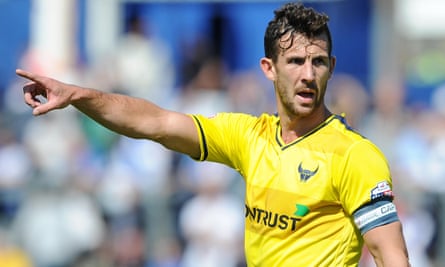
Blackburn should be the enemy. After all, Jake Wright grew up as a Burnley supporter, running out as a mascot at Turf Moor aged five and in among the 35,000 Clarets at the Second Division play-off final against Stockport in 1994. Wright had watched from the disabled section at Wembley that day, an eight-year-old confined to a wheelchair by osteomyelitis. He was fortunate not to have lost his legs.
The fact he has gone on to enjoy an 11-year professional career, taking in almost 400 senior games at five clubs from Bradford to Brighton, is remarkable. “I’ve come a long way since I was sat in that wheelchair,” he says. “I was lucky enough that Steve Bollen, a knee specialist who deals with a lot of clubs up north, was in on the day I went to hospital with the condition and he ending up operating on me on the NHS. After a year or so he had me back up and playing again and I went from my village team – basically me and my mates, my sister too, losing every week and using our front room as a changing room – to Long Lee and then eventually into the professional game.
“Drawing Blackburn is perfect and beating them would mean everything. My dad, Keith, and my uncle, Nigel, are Burnley through and through and will probably be there wearing their replica shirts under their coats. But, for Oxford, this is massive. Personally I’ve got to be careful to stay a bit detached from that side of it. The first time I went back to Bradford with Oxford I was sent off with 20 minutes to go. My worst day in football. I thought I was experienced, but that was the first time I’d been emotionally involved in the game and I got too carried away. We ended up with nine men and lost 5-0.”
Remaining detached may be difficult given how momentous the occasion will feel for his adopted club. Wright is the heart and soul of a side on the up, a player who endured non-league and is now hoping to grace the third tier. “This is the best the club’s been in my time here, from the chairman down,” he adds. “The togetherness with the fans is the best it’s ever been. We’ve beaten Brentford, Swansea, Millwall and Swindon in cup competitions this season, all from leagues above us, and we’ve stuck to our own style to do so. We didn’t beat Swansea in a ‘League Two way’, suddenly thinking: ‘Swansea won’t want long balls or a physical game.’ We’re not about that. If and when we do get to League One, we’ll be better suited there.”
The executive chairman and majority shareholder: Darryl Eales
Eales made his fortune in private equity and became chairman at Oxford in the summer of 2014. He was instrumental, alongside the now departed Mark Ashton, in recruiting Appleton and has helped breathe new life into the club.
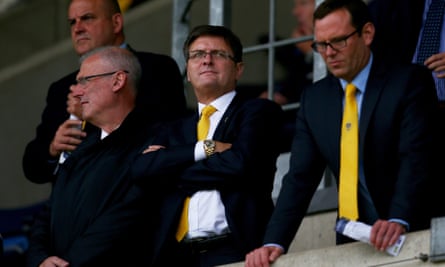
FA Cup fourth-round week and Darryl Eales has hardly had time to contemplate the visit of Blackburn to a sold-out arena. He began the buildup in India, where he was discussing a potential and innovative developmental partnership with the I-league side Bengaluru FC. On his return he flung himself back into the day-to-day issues that need addressing at his own club: negotiations with the local council and BMW over a move to a new purpose-built training ground; the bolstering of the squad before the transfer deadline; and, ultimately, the purchase of the Kassam Stadium.
He describes that last issue as “the elephant in the room”, with United still renting their home from the previous owner, Firoz Kassam. “We’re making good progress on the training ground but, longer term, we need to have complete control of our own destiny,” says Eales. “I’m making progress but it will only move at the pace of the slowest cog in the wheel. Kassam, the various councils … I think we have a good dialogue and there’s a willingness to find a solution but all our agendas don’t necessarily always overlap. The success of the club will help. I’m pretty sure Oxford United still has a place in Firoz’s heart because he texts me with ‘great result’ after every game these days.”
That success has been smoothed by Appleton’s impact. “I liked the way he wanted to go about the task: detailed preparation; meticulous approach to sports science; player discipline; preparation for matches,” says the chairman. “Generally, the winners at anything over the medium term are the people who prepare to win. You can fluke a season, but if you are trying to build sustainable success, you have to put in place the right foundations. And Michael is all about self-improvement and development. You can see that in the fact he’s doing his Masters [in sport directorship] at Manchester Metropolitan University.”
The owner backed the science. Oxford are one of only a few League Two clubs to employ a full-time analyst. They have a head of football logistics and an arrangement with the psychiatrist Steve Peters. They could soon also benefit from an exchange programme with Bengaluru, who are coached by Appleton’s former assistant Ashley Westwood. “The owners, the Jindal family, are trying to improve the quality of Indian football in the hope the national team might qualify for the 2026 World Cup,” adds Eales. “We’ve been talking about ways we can help given the natural relationships involved. We could take a few of their players and put them through our coaching regime for three to six months so they go back better players, and there could be an exchange the other way for our promising youngsters. It was a really good three or four days. Now we’ll reflect and see what happens next.”
The club stalwart: Chris Allen
A youth-team product and England Under-21 international, the winger played 181 games for Oxford from 1991-96 before moving to Nottingham Forest. He returned as an academy coach six years ago, working from Under-9s through to the youth team, and was promoted to the senior staff last summer.
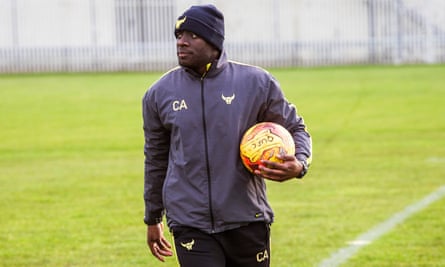
Allen baulks at the suggestion he remains one of the last Oxford United youth-team graduates to forge himself a lengthy senior career. He points, with some justification, to Dean Whitehead and mentions the part the club played in Dexter Blackstock’s early development. “But I take the point,” he says. “We want to bring more through the set-up, that is our priority, and it is something that is happening again. We are a Category Three academy aiming for Category Two status, and we are making progress. Young lads are coming through again.”
Players such as Sam Long, James Roberts, Josh Ashby, Robbie Cundy and Max Crocombe are making steady progress. That of Callum O’Dowda, a winger like Allen, has been more eye-catching with the Republic of Ireland Under-21 international regularly luring the scouts to the Kassam. “He’s quick, can go inside or outside, and he’s agile,” says Allen. “As a young lad he was a wispy boy, people saying he didn’t have a chance because he was very skinny and wiry, but look at him now. He has a good physique, and a good turn of direction from a standing start. I just had pace, really, and a little bit of a trick so he has a bit more than me at his age. There is so much talent there.” Derby County have emerged as the 20-year-old’s primary suitors, and a deal worth £1m has been mooted, ensuring O’Dowda is the poster boy of the moment for Oxford’s revived youth system.
Other gems in Appleton’s ranks have been plucked from development football, with Appleton’s scouts having earmarked “up to two dozen” youngsters in reserve and academy squads elsewhere for whom a move will be made if they become available. John Lundstram and Kemar Roofe fell into that category. “You get lads who haven’t quite made their mark at the likes of Aston Villa, West Brom or Everton, but are good enough to do a job for us,” adds Allen. “That pushes those we already have. It’s about bringing in people who are hungry and eager to learn. I look back at my playing time at the Manor as good days, when we competed well up against bigger teams. But I’d say the side we currently have isn’t that far away from what we had back then. Everything is in place here to build and go again.”
The entertainer: Kemar Roofe
It was Roofe’s two goals that saw off Swansea and the 23-year-old, who commutes to Oxford from his home in Walsall, has scored 18 goals in a productive first full season in senior football after his summer move from West Bromwich Albion.
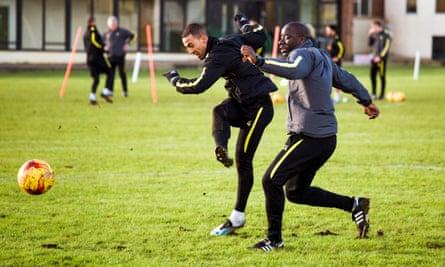
Kemar Roofe is still waiting for David Jones, the Sky Sports presenter who sits on the board at Oxford United, to introduce him to his idol. The prospect of meeting Thierry Henry has been on the cards all season but even more so since the League Two club’s leading scorer cut in from the left beyond Swansea’s Liam Shephard, opened up his body on the edge of the area and curled a delicious shot beyond Kristoffer Nordfeldt and inside the far post.
“That was his iconic finish and I can see a bit of Henry in it now when I watch it back,” says Roofe through a smile. “He’s the reason I supported Arsenal and someone whose goals I still study. His attitude, his enthusiasm, his work-rate and the fact he was an entertainer … football is expensive to watch nowadays so, if I go to a game, I want to see someone who’ll get me up out of my seat. He did that. So that’s what I try and do, too.”
Roofe, described as “ridiculously focused” by his manager, has been thrilling spectators and attracting scouts from higher up the food chain all season having seized his chance in senior football. Secured to West Brom’s academy at the age of seven, the attacking midfielder’s career had rather stagnated in under-21s football interspersed with the odd loan move. “I did well at West Brom for quite a few years in the under-21s and still never got a chance, so I can only suppose they didn’t consider the standard of football good enough,” he says. “I’d get goals, provide assists, do well in games but it wouldn’t get me anywhere.
“No one was bothered. Or they’d just dismiss it as having been achieved ‘against kids’. Since I’ve had a chance in senior football here I’ve developed massively because everyone can see what I can actually do. They take it seriously because it’s against proper opposition in the Football League. I’d got to the point where I wasn’t enjoying it as much as I should because I wasn’t being rewarded or seeing any progression in my game. Oxford changed that.”
Roofe has thrived all year, providing the bite to Oxford’s slick approach play, and opportunities to rise through the divisions will surely follow. His Henry obsession aside, he has drawn inspiration from the progress made by others who have developed relatively late to impress in the elite. “It’s been fantastic to see what Jamie Vardy and Charlie Austin have done, putting lower league players on the map again,” he adds. “Football had got to the stage where clubs just looked abroad for players, instead of looking at English talent at the lower levels. Vardy has woken everyone up.”

Comments (…)
Sign in or create your Guardian account to join the discussion